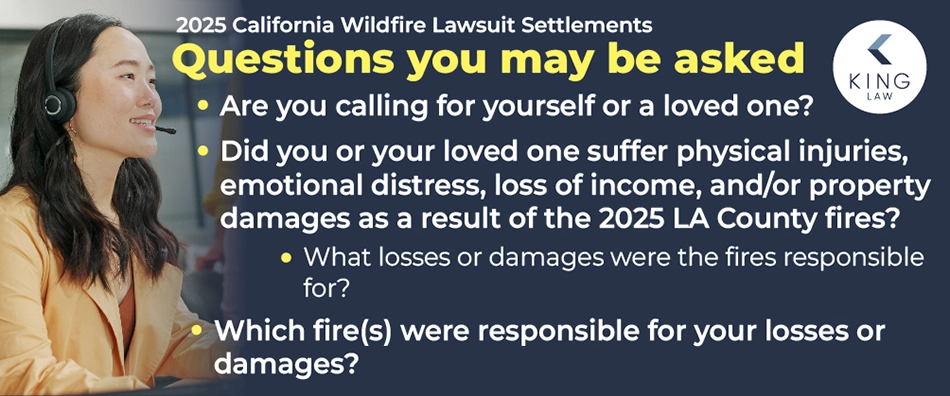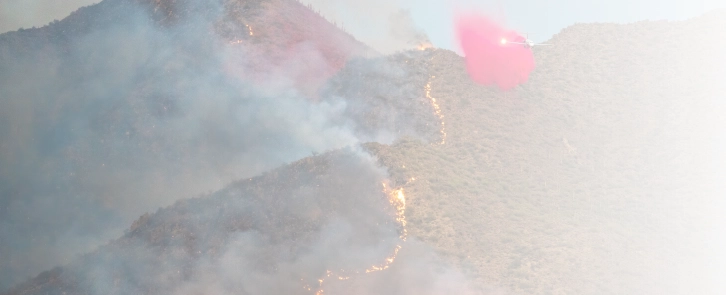
Many victims of the California wildfires will pursue settlements to cover the costs of their losses. Victims may be entitled to payouts if they file an insurance claim or a lawsuit against Southern California Edison, their insurance company, or another entity.
Our attorneys and legal partners can fight for your right to receive money for wildfire-related losses. Those losses could include the death of a loved one, a physical injury, or pain and suffering. Additional losses include damaged or destroyed homes, land, landscaping, personal property, buildings, or cars. Additionally, we may be able to secure a settlement for your medical bills, evacuation expenses, lost income, or commercial losses.
California Fire Settlement Updates
JANUARY 27, 2025: Eaton and Palisades Wildfires Consume Over 16,200 Buildings in Historic Natural Disaster
While authorities are still investigating the cause and costs of the January 2025 wildfires, reports reveal that the Palisades and Eaton fires alone destroyed over 16,200 structures. Other blazes—such as the Hurst, Hughes, and Border 2 fires—have consumed thousands of acres and overtaken dozens of buildings and communities, including homes, cinemas, iconic restaurants, schools, libraries, hospitals, and other local staples. Victims are beginning to file lawsuits to stand up against the injustices they experienced and demand compensation.
JANUARY 23, 2025: ABC Reports that California Insurance Commissioner Ordered Some Insurers to Make Advanced Payments
According to ABC News, California’s Insurance Commissioner issued a directive for many insurance companies to make advance payments to people who experienced a total loss. How much someone receives and when depends on their unique situation and the rules that apply to their policy. Additionally, policyholders would still have to file a claim to receive these funds. Before claimants accept money from their insurance provider or anyone else, they are encouraged to talk to an attorney to ensure they receive full and fair compensation.
About California Wildfire Settlements and Payouts:
California Fire Settlement Overview
How California Wildfire Settlements Work
Wildfire Settlement Procedures in California
Types of Settlements Available to California Wildfire Survivors
Estimated Payout Range for California Wildfire Victims
Factors That May Impact Settlement and Payout Amounts
How Payouts Will Be Distributed to California Wildfire Survivors
Are Settlements From Fire Losses Taxable in California?
Ways King Law Helps You Reach a Settlement
Contact a California Wildfire Attorney to Maximize Your Payout
California Fire Settlement Overview
If the California wildfires harmed you, you may be entitled to compensation via a settlement or other means. King Law is actively accepting California wildfire cases, and we anticipate that some of these payouts may be substantial. However, each settlement and payout will reflect the law and facts of the specific claim.
Even if victims do not think they have a strong case, we encourage them to contact us. Many victims may not know the value of their claims, and we can use our legal knowledge to uncover many potential avenues for financial recovery.
If you are worried about costs, our team offers free consultations. Our in-house intake team can evaluate your damages and estimate your possible settlement.
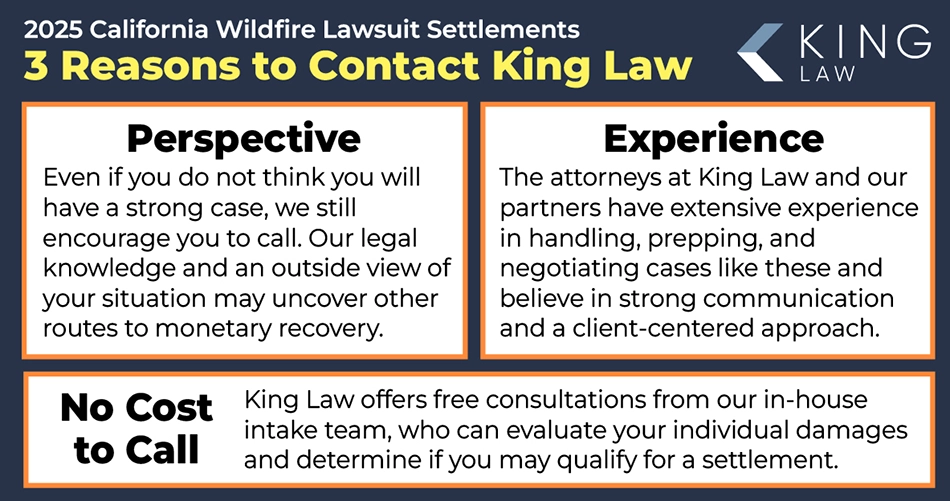
How California Wildfire Settlements Work
Seeking legal damages for your fire-related losses begins with knowing who qualifies for compensation and who may be at fault. Additionally, wildfire victims can build a strong case by identifying their losses and the value of those losses, as well as gathering evidence to strengthen their cases against those who are to blame. Settlements may come from utility companies, insurance companies, or other entities.
Who Qualifies for Compensation in the California Wildfires?
Those impacted by the wildfires in California in any way may qualify to request a settlement award. People who may be eligible for a financial payout include the following:
- Homeowners: If your home or property was damaged or destroyed in the fires, you may qualify. You may also qualify for displacement reimbursement.
- Renters: If you rent your residence and lost personal belongings or incurred displacement costs, you may be eligible.
- Business Owners: Business people who incurred financial losses, such as lost income, damaged business property, or destroyed inventory may qualify.
- Farmers: Agricultural professionals who experienced losses like destroyed crops, lost livestock, lost supplies, or agricultural equipment may qualify.
- Injured Individuals: Those who sustained personal injuries or lost a loved one due to the wildfire (wrongful death) may be able to receive a settlement or jury award.
- Utility Customers: Those affected by fires caused by utility companies, including individuals indirectly impacted by rate hikes, public disruptions, or forced displacement caused by power outages or related issues may be able to receive compensation.
People not listed above may still qualify if they prove their losses are related to the wildfire. If you are curious whether you may be entitled to a settlement, we encourage you to contact King Law to schedule a free consultation. We can discuss your situation and let you know if you are among the thousands who qualify.
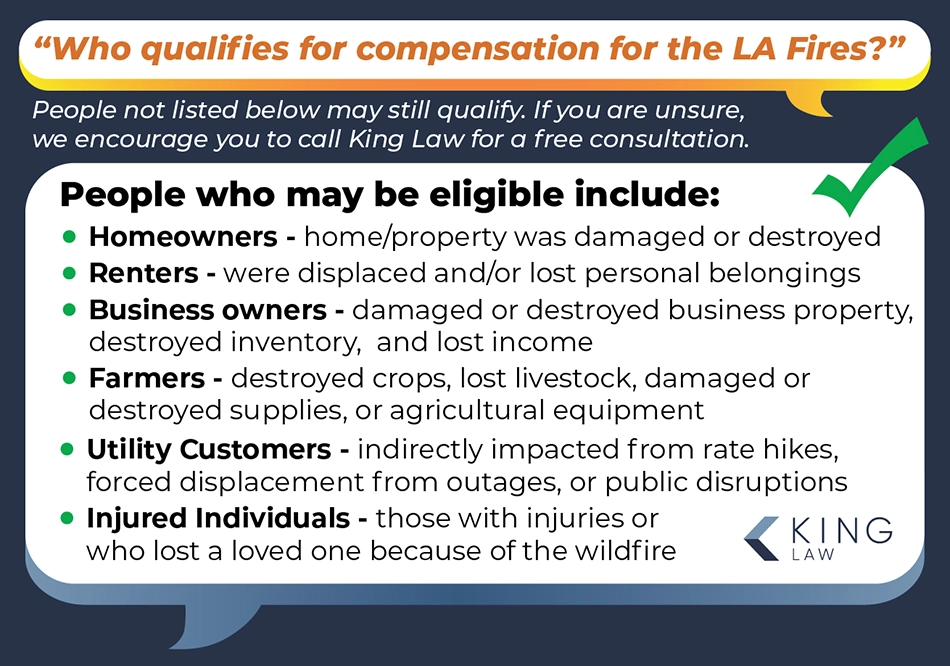
Who Is Being Held Liable for the California Wildfire Damages?
Southern California Edison
Many fire victims believe Southern California Edison is to blame for some of the wildfires. For example, Eaton and Hurst Fire witnesses saw sparks, heard loud popping noises, and observed new flames near SCE equipment. They say SCE did not de-energize its equipment quickly enough during the Red Flag Warning or after the fires erupted, potentially causing or perpetuating blazes that overtook thousands of acres of land, leveled hundreds of homes, killed over a dozen people, and injured many more. Many people have filed lawsuits against SCE, and investigations are underway.
Insurance Companies
Insurance companies may not be at fault for starting the infernos; however, they are required by law and by contract to honor claims submitted by those they insure. When insurers act in bad faith when denying, delaying, or underpaying claims, their customers can sue them for failing to follow through on their contractual obligations.
Arsonists
Arsonists are another culprit for wildfire damages. Investigations are still underway to determine whether arsonists caused any of the major blazes that swept through Southern California. However, since the infernos erupted in January 2025, authorities have arrested many copycats who started new, smaller fires that were discovered and extinguished. Victims can hold arsonists accountable in a civil lawsuit to recover damages to their property.
Wildfire Settlement Procedures in California
A victim can request a settlement by following a formal legal procedure. The process includes filing a lawsuit, preparing for trial, and negotiating a settlement. The victim may participate in a courtroom trial if settlement talks are unsuccessful. From there, the victim would either receive a payout if they win their case or file an appeal if they do not. An attorney can help victims move through these steps with ease and confidence.
Step 1: Filing a Lawsuit
The first step in seeking compensation is to file a lawsuit against those responsible for your losses. You can accomplish this with the guidance of an attorney with vast experience handling wildfire claims. The lawyer and their dedicated team can prepare your case for filing by writing the complaint and locating robust evidence. They can also submit these documents to the proper court and represent you during the lawsuit.
Step 2: Legal and Pre-Trial Proceedings
The pre-trial proceedings include the discovery phase and motion practice. Discovery is when you and the other parties involved—such as SCE—ask for and submit information to learn about the incident, its consequences, and potential legal arguments. Each side may also file motions, including motions to dismiss or to request guidelines about what information each side can use during legal proceedings.
Step 3: Settlement Negotiations
The third step involves negotiating a possible settlement to resolve the claim without going to trial. The victim or their attorney (if they have one) would talk to the defendant and their legal counsel about a potential financial agreement to settle the case. Typically, these agreements may involve the defendant—such as SCE—agreeing to pay the victim a specific amount in exchange for the victim dropping the charges.
Step 4: Trial Proceedings
If the victim cannot reach an acceptable settlement with the defendant, they may need to go to trial. At trial, each side presents its arguments, evidence, and proposal for a fair outcome. Then, depending on the kind of trial, the judge or jury would decide who wins the case.
Step 5: Post-Trial and Appeals
If the plaintiff (victim) wins their case, they will receive a settlement, verdict, or judgment in their favor. These orders are enforceable and require the defendant (wrongdoer) to pay the plaintiff money. If the plaintiff is unsuccessful, they may appeal or challenge the denial, potentially giving them a second chance at receiving what they are entitled to under the law.
Step 6: Distribution of Compensation
Once the plaintiff receives a favorable outcome, the next step is for them to receive a payout from the defendant(s). The plaintiff may receive a lump-sum check or periodic payments depending on the agreed-upon or court-ordered arrangement. The plaintiff may receive this money directly from the defendant or a third party handling the payout.
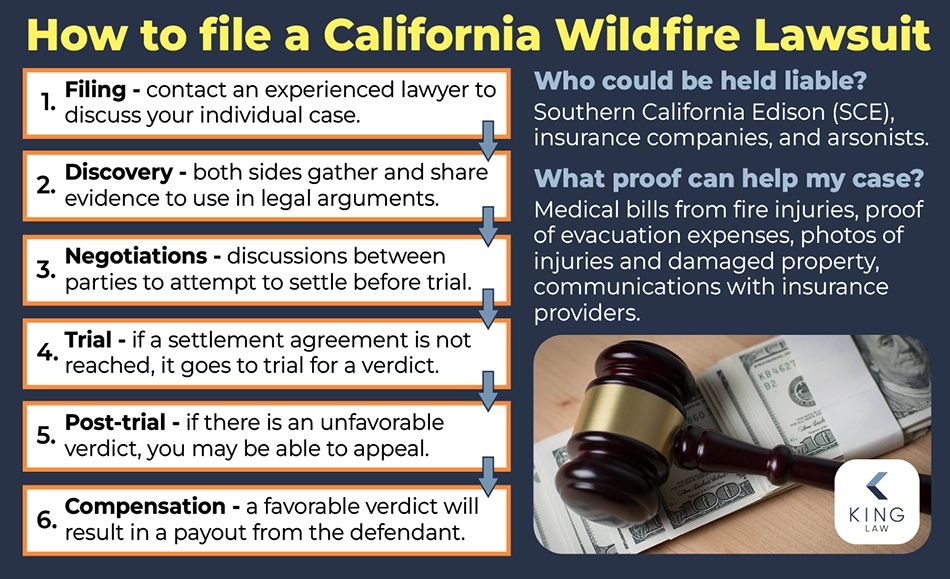
Types of Settlements Available to California Wildfire Survivors
Victims of the California wildfires may be eligible for compensation for many different types of losses. For example, victims may qualify for money to clear smoke damage from their homes, fire-related income disruptions, and evacuation expenses. The compensation a victim receives depends on the losses they experienced because of the fire or its fallout.
Real Property and Personal Property
Victims may request compensation to cover damages to their real property—e.g., land, commercial building, or house—and personal property. Settlements may include money to repair smoke, wind, or fire damage to their home, car, shed, garage, fence, commercial buildings, landscaping, or other structures. People may also be compensated for charred, destroyed, or harmed personal belongings, such as clothing, furniture, valuables, or memorabilia.
Economic Losses and Damages
People may be eligible for a range of economic losses. For example, business owners may request restitution for their lost revenue or increased expenses due to evacuation orders or fire damage. Farmers and ranchers may be entitled to reimbursement for destroyed crops and timber, lost livestock, and other disruptions to their agricultural activities.
People who had to evacuate may also request money for relocation expenses, temporary housing, and food. Parents who had to manage school closures and interruptions to their children’s learning may also qualify for payment of their childcare costs, alternative schooling expenses, and tutoring.
Non-Economic Losses and Damages
Financial losses are only one aspect of potential compensation for wildfire victims. Survivors of this historic tragedy must also manage the pain, suffering, trauma, and diminished quality of life in its aftermath. Noneconomic damages compensate victims for the social, emotional, relational, and physical hurt they have endured because of the wildfires.
Personal Injury and Wrongful Death
With thousands of evacuations in place in a blaze that overtook nearly 100 square miles, many people suffered injuries in the fires and as they fled to safety. Likewise, the California wildfires claimed dozens of lives, with the official death toll expected to rise as authorities sift through the wreckage.
Victims and surviving family members can claim compensation for medical bills they had to pay, such as to treat fractures or sprains, smoke damage to their lungs or eyes, or illnesses they got from drinking contaminated water. Surviving family members may also recoup monetary damages in a wrongful death lawsuit.
Additional Living Expenses
Thousands of people evacuated as the flames threatened to engulf the region. If you were among those who had to seek shelter elsewhere, you may qualify for reimbursement for your additional living expenses. This might include groceries, transportation costs, temporary housing fees (e.g., hotel charges), and other related expenses during the evacuation or afterward.
Estimated Payout Range for California Wildfire Victims
Because of the extent of the damage and the areas impacted, the 2025 wildfires are on track to be among the costliest in California’s history—potentially totaling over $125 billion in damages, according to some estimates. Our law firm projects that some victims will receive between $50,000 and $10 million, but the final numbers depend on each victim’s losses and other factors. Because of the diverse impacts the wildfires had on individuals and communities, each victim’s settlement will vary significantly.
Factors That May Impact Settlement and Payout Amounts
Each person’s settlement will reflect the facts involved in their specific case, so payouts will vary. Factors that can affect how much compensation someone recovers include the extent of their economic losses—medical bills, repair costs, smoke damage, etc.—and how much the fire impacted their quality of life. Additionally, those who lost a loved one in the blaze may receive a higher settlement than others.
How Payouts Will Be Distributed to California Wildfire Survivors
Wildfire victims receive their settlement payout based on their agreement with the at-fault individual or organization. After deducting various expenses, the victim may receive an electronic deposit or check, and this payout may be made in a lump sum or in periodic payments.
If the victim had hired their attorney on a contingency basis, their lawyers would receive a percentage of the payout directly from the fund. Some victims may be involved in a class action or multidistrict litigation. In that case, a third party may manage and distribute the funds based on the terms of a master settlement agreement.
Are Settlements From Fire Losses Taxable in California?
A December 2024 change to the taxation laws allows many wildfire victims to receive their settlements without paying hefty federal income taxes on the funds. However, some may have to pay state taxes on a portion of their settlement; this depends on their unique tax situation and how they receive the funds. For example, different rules may apply to those who receive a check from their insurance company versus a court verdict. People may also qualify for exemptions based on declared disasters, potentially lowering their tax burdens. It is important to talk to an accountant and your attorney to determine which payouts are taxable and which are not.
Ways King Law Helps You Reach a Settlement
King Law can help you prepare and present a strong legal case against those who caused the wildfires that harmed you or claimed the lives of your loved ones. Our legal partners have extensive experience conducting strategic negotiations and creating personalized and targeted solutions to clients’ challenges. Our team of legal partners believes in the power of effective communication and taking a client-centric approach to seeking empowering solutions.
Contact a California Wildfire Attorney to Maximize Your Payout
Start the process of receiving compensation by calling our legal team today at (585) 496-2648 to set up a time to talk to us during a free consultation. You deserve justice and a fair financial award because of what you have been forced to endure during this tragedy. Our wildfire legal team is here to help.
